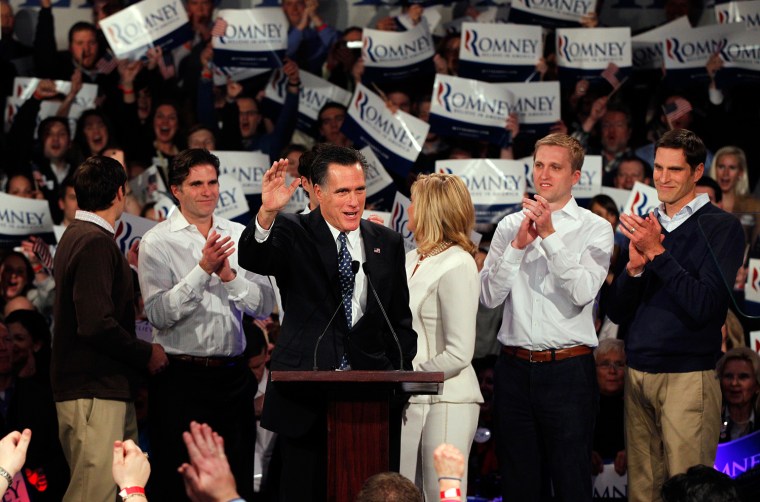Mitt Romney won the New Hampshire primary Tuesday night with a broad-based coalition of both conservative and moderate voters overwhelmingly motivated by their worries about America’s economic future and wanting above all to beat President Barack Obama in November.
According to exit poll data, more than a third of voters on Tuesday said the quality that mattered most in deciding their vote was the candidate’s ability to defeat Obama. Romney won an overwhelming 62 percent of those voters.
Regardless of how they voted, 56 percent of Tuesday’s voters thought Romney would be most likely to beat Obama in November; the runner-up in that category was Rep. Ron Paul of Texas with only 15 percent and only 11 percent saw former ambassador to China Jon Huntsman as most likely to defeat Obama.
Even though Tuesday was a Republican primary, independents could request Republican ballots and vote in the primary.
Remarkably, self-described independents accounted for nearly half of all voters Tuesday – a piece of data which has implications for November. Paul won 32 percent of independents, with Romney getting 29 percent, and Huntsman picking up 23 percent of them.
In his 2000 battle with Al Gore, George W. Bush won New Hampshire by 7,211 votes out of a total of nearly 570,000 votes. If Romney is the GOP nominee that would make New Hampshire competitive this fall. Having an appeal to independents would be crucial to his hopes of carrying the state and its four electoral votes.
Recommended: NBC News: Romney wins N.H. primary, Paul second
Among self-described Republicans Romney won a solid 49 percent of them, according to exit poll interviews. The closet contenders with appeal to Republicans were Paul with 16 percent and former Pennsylvania Sen. Rick Santorum with 13 percent.
Huntsman invested heavily in New Hampshire and will likely finish a distant third once all the votes are counted.
Given this, is he the alternative for moderate Republicans? Maybe not: Romney bested Huntsman among self-described moderates, 39 percent to 26 percent.
And based on the New Hampshire exit poll, to whom might anti-Romney conservatives turn? Romney won 42 percent of conservatives Tuesday with Paul finishing second among that segment of voters with 19 percent. Santorum got 15 percent of conservatives.
Republican presidential hopeful Mitt Romney addresses supporters in Manchester on January 10, 2012 after seizing a second victory in his fight to be the party's presidential nominee, winning New Hampshire's key primary.
Romney performed best among the highly educated (winning 42 percent of college graduates), among upper income voters, and among older voters.
He did less well among lower income people– winning 31 percent of those earning less than $30,000 a year. Paul did best among that group winning 36 percent of them.
While nearly seven out of ten exit poll interviewees said they were “very worried” about the direction of the nation’s economy in the next few years, only 16 percent said their own family was falling behind financially. Of that “falling behind” group, Romney ran first, winning 32 percent of them to Paul’s 29 percent.
Paul dominated among voters aged 18 to 29, winning 47 percent of them but they accounted for only 12 percent of the electorate, according to exit poll interviews.
Gingrich’s lackluster performance did not seem to bode well for the South Carolina contest – he could not break above 20 percent for any of the age, income, ideological or demographic groups that were identified in the exit poll sample.
Likewise Santorum -- who did very well only among the roughly one-fifth of the electorate who called themselves “very conservative.” Santorum won 26 percent of such voters – but Romney won 33 percent of them.
One surprising finding: Santorum, a Catholic, won only about 8 percent of self-identified Catholic voters, a serious underperformance on his part since Catholics accounted for more a third of the electorate Tuesday. Gingrich, also a Catholic, won 10 percent of Catholic voters, according to exit poll interviews.
Romney, a Mormon, dominated among Catholics winning 45 percent of them.
Possible implications for November in exit poll data
Mitt Romney won the New Hampshire primary Tuesday night with a broad-based coalition of both conservative and moderate voters overwhelmingly motivated by their worries about America’s economic future and wanting above all to beat President Barack Obama in November.
